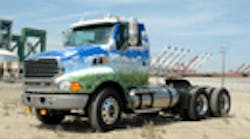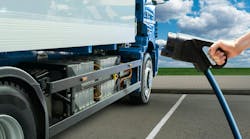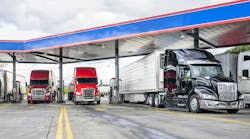As the price of diesel fuel falls, the allure of switching to a less expensive natural gas system seemingly is falling as well. However, Leo Thompson, executive director of the Natural Gas Vehicle Institute (NGVI) contends that there are still numerous benefits to installing either a compressed natural gas (CNG) or liquefied natural gas (LNG) system.
Speaking during a webinar entitled “Best in Show: Why Fleets are Flocking to Natural Gas,” Thompson said that although the price of oil is down and the price of natural gas has slightly risen, natural gas is still a more abundant, cleaner fuel that is lower in emissions than gasoline and diesel.
“Nationwide, the fuel cost can range anywhere from 30 to 50% less than gasoline, with natural gas currently as low as 87 cents in Utah,” Thompson said, noting that the price of natural gas can run as high as $2.35 per gasoline gallon equivalent (GGE), still less expensive than gasoline, E85, diesel, biodiesel or propane.
According to Thompson, there is at least 118 years of natural gas in reserve at today’s current production levels, more than three times as much as oil. And unlike oil, 98% of the reserves currently used in the United States comes from local sources. “Natural gas is made in America—it’s a domestic resource and is abundant in its supply here,” he said.
The difference between the two natural gas forms is how they are used. LNG can go up to 500 miles on one fill up and is more appropriate for fleets such as long-haul trucks that require a maximum amount of fuel. CNG, on the other hand, is designed more for short-haul, light- and medium-duty vehicles that don’t need to go as far on a single fill-up.
According to Thompson, natural gas performance is similar to gas and diesel in fuel economy, delivering 65 to 100% of the range with comparable acceleration, payload and cruise speed.
Both CNG and LNG require engine modifications and special fueling facilities, Thompson said, with conversion costs ranging anywhere from $10,000 to $20,000. However, he said despite the price, life-cycle costs can be lower for natural gas than petroleum-fueled vehicles. Special fueling facilities are available nationwide, but are most common on the East and West coasts, especially in California and between Boston and Washington D.C.
Thompson warned that potential buyers need to check whether there is a conversion system available for the particular model or brand of vehicle they are planning to buy. There are two types of conversions—Bi-fuel, which can run on either gasoline/diesel or natural gas and requires two sets of injectors; or dedicated, which removes gasoline injectors entirely and only runs on natural gas.
Natural gas can be factory-installed in a number of Class 8 vehicles with a Cummins ISL-G 8.9L engine. Many Autocar, Foton America and Crane Carrier models can be ordered with either CNG or LNG, while the Kenworth T800, Sterling Set-Back 113 and Peterbilt Models 320, 386, and 387 can be factory-installed with LNG, according to NGVI.




